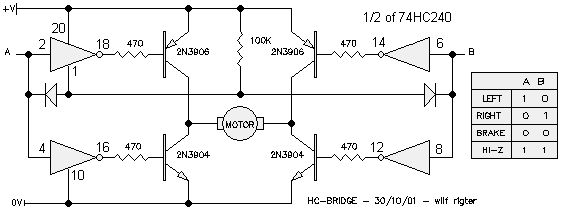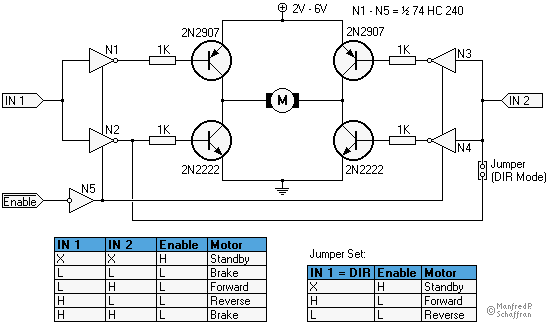|
|
The BEAM Circuits Collection is a BEAM Reference Library site.
Inverter buffered H-bridges
Design, limitations,
usage
Two independently-developed, but very similar designs use a 74HC240's inverters to buffer inputs to a 4-transistor H-bridge.
Wilf Rigter was first with his HC bridge:

Over the course of several posts, Wilf had this to say about his design:
|
Here is a smokeless design I will call HC-bridge because it combines the best features of the H bridge and CMOS motor drivers. It has forward, reverse, freewheel and brake modes. For low voltage applications (ie 1.5V or 2.4V), the HC-Bridge circuit can be further simplified by using direct transistor base drive (no base resistors), since the base current is limited by the HC output resistance. That "baseresistorless" design was used more recently in the uRover circuit. |
Manfred Schaffran followed a few months later with his SH (solar H-) bridge:

Manfred had this to say about his circuit:
|
I had a few problems with the 74HC240 motor driver. So i designed a new (?) motor driver for higher current output. Features:
|
Meanwhile, Wilf had his own comments on the design:
The single input direction control option of the SH-Bridge is a nice touch. With fewer components required for a two wire h-bridge control circuit with "standby" but without "brake" your circuit wins on that count.Note that the SH-Bridge uses one HC driver output also for logic level inversion so [in a two wire control form] it cannot be used without a base resistor. But the original three wire SH-Bridge can certainly be used at 2V without base resistors!
Note too that one of the unique features of the SH bridge is its provision of a separate enable line, and accompanying standby mode -- a very handy feature for low-voltage (likely solar powered) 'bots.
|
|
|
|
|
|
||
|
|
This page was last updated on |
|